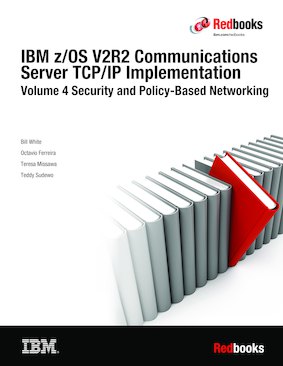About cookies on this site Our websites require some cookies to function properly (required). In addition, other cookies may be used with your consent to analyze site usage, improve the user experience and for advertising. For more information, please review your options. By visiting our website, you agree to our processing of information as described in IBM’sprivacy statement. To provide a smooth navigation, your cookie preferences will be shared across the IBM web domains listed here.

Published on 17 March 2017, updated 21 March 2017
Read in Google Books Order hardcopy
Share this page:
ISBN-10: 0738442240
ISBN-13: 9780738442242
IBM Form #: SG24-8363-00
Authors: Bill White, Octavio Ferreira, Teresa Missawa and Teddy Sudewo
Abstract
For more than 50 years, IBM® mainframes have supported an extraordinary portion of the world's computing work, providing centralized corporate databases, and mission-critical enterprise-wide applications. IBM z® Systems, the latest generation of the IBM distinguished family of mainframe systems, has come a long way from its IBM System/360 heritage. Likewise, its IBM z/OS® operating system is far superior to its predecessors in providing, among many other capabilities, world-class and state-of-the-art support for the TCP/IP Internet protocol suite.
TCP/IP is a large and evolving collection of communication protocols managed by the Internet Engineering Task Force (IETF), an open, volunteer organization. Because of its openness, the TCP/IP protocol suite has become the foundation for the set of technologies that form the basis of the Internet. The convergence of IBM mainframe capabilities with Internet technology, connectivity, and standards (particularly TCP/IP) is dramatically changing the face of information technology and driving requirements for ever more secure, scalable, and highly available mainframe TCP/IP implementations.
The IBM z/OS Communications Server TCP/IP Implementation series provides understandable, step-by-step guidance about how to enable the most commonly used and important functions of z/OS Communications Server TCP/IP.
This IBM Redbooks® publication is for people who install and support z/OS Communications Server. It explains how to set up security for your z/OS networking environment. With the advent of TCP/IP and the Internet, network security requirements have become more stringent and complex. Because many transactions are from unknown users and untrusted networks such as the Internet, careful attention must be given to host and user authentication, data privacy, data origin authentication, and data integrity. Also, because security technologies are complex and can be confusing, we include helpful tutorial information in the appendixes of this book.
For more information about z/OS Communications Server base functions, standard applications, and high availability, see the other following volumes in the series:
- IBM z/OS V2R2 Communications Server TCP/IP Implementation Volume 1: Base Functions, Connectivity, and Routing, SG24-8360
- IBM z/OS V2R2 Communications Server TCP/IP Implementation Volume 2: Standard Applications, SG24-8361
- IBM z/OS V2R2 Communications Server TCP/IP Implementation Volume 3: High Availability, Scalability, and Performance, SG24-8362
This book does not duplicate the information in these publications. Instead, it complements those publications with practical implementation scenarios that might be useful in your environment. For more information about at what level a specific function was introduced, see z/OS Communications Server: New Function Summary, GC31-8771.
Table of Contents
Chapter 1. RACF demystified
Chapter 2. Protecting network resources
Chapter 3. Certificate management in z/OS
Chapter 4. Policy agent
Chapter 5. Centralized policy server
Chapter 6. Quality of service
Chapter 7. IP filtering
Chapter 8. IP Security
Chapter 9. Network Security Services for IPSec clients
Chapter 10. Network Security Services for WebSphere DataPower appliances
Chapter 11. Network Address Translation traversal support
Chapter 12. Application Transparent Transport Layer Security
Chapter 13. Intrusion detection services
Chapter 14. IP defensive filtering
Chapter 15. Policy-based routing
Chapter 16. Telnet security
Chapter 17. Secure File Transfer Protocol
Appendix A. Basic cryptography
Appendix B. Telnet security advanced settings
Appendix C. Configuring IPSec between z/OS and Windows
Appendix D. zIIP Assisted IPSec
Appendix E. z/OS Communications Server IPSec RFC currency
Appendix F. Implementation environment